Related Research Articles

"America" is a song written and originally recorded by Neil Diamond, released in 1980 on the soundtrack album of Diamond's film The Jazz Singer. The song was a hit single in the United States in 1981, reaching number eight on the Billboard Hot 100, and was Diamond's sixth number one on the Adult Contemporary chart. Billboard also rated it the #62 pop single overall for 1981. Although the single version was a studio recording, overdubs of crowd cheering simulate the feel of a live performance.

"Play Me" is a 1972 song by Neil Diamond from his album Moods. The song, the first single from Moods, was recorded in February 1972 in Los Angeles. It was released as a single in May 1972 and peaked at #11 in the United States in September of that year. It was listed by Billboard as #27 of his best 30 songs.

"Still" is a 1979 song by the soul music group the Commodores. It was released as a single on Motown Records with "Such a Woman" as the B-side. The song appears on their 1979 hit album Midnight Magic. It is notable for being their last No. 1 before Lionel Richie went solo.

"Kentucky Woman" is a 1967 song written and originally recorded by Neil Diamond.
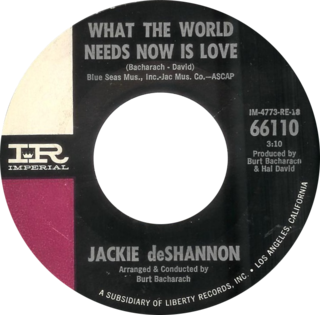
"What the World Needs Now Is Love" is a 1965 popular song with lyrics by Hal David and music composed by Burt Bacharach. First recorded and made popular by Jackie DeShannon, it was released on April 15, 1965, on the Imperial label after a release on sister label Liberty records the previous month was canceled. It peaked at number seven on the US Hot 100 in July of that year. In Canada, the song reached number one.
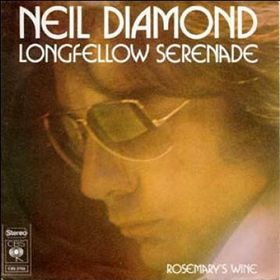
"Longfellow Serenade" is the title of a 1974 song by the American singer-songwriter Neil Diamond. It was written by Diamond, produced by Tom Catalano, and included on Diamond's album Serenade.

"Song Sung Blue" is a 1972 hit song written and recorded by Neil Diamond, inspired by the second movement of Mozart's Piano Concerto #21. It was released on Diamond's album Moods, and later appeared on many of Diamond's live and compilation albums. The song was a #1 hit on the Billboard Hot 100 chart in the United States for one week, the week of July 1, and it spent twelve weeks in the Top 40. It also made the pop chart in the United Kingdom, reaching #14 on the UK Singles Chart.
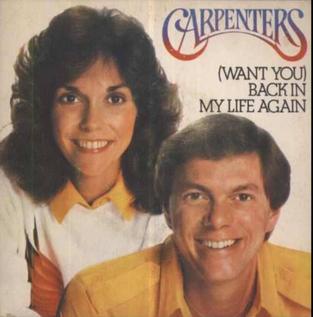
"(Want You) Back in My Life Again" is a song by the popular group the Carpenters, the second single off their album Made in America, released in 1981. The song reached #72 on the U.S. Billboard Hot 100. Its B-side was "Somebody's Been Lyin'", another song from the album.
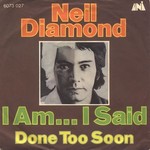
"I Am... I Said" is a song written and recorded by Neil Diamond. Released as a single on March 15, 1971, it was quite successful, at first slowly climbing the charts, then more quickly rising to number 4 on the U.S. pop singles chart by May 1971. It fared similarly across the Atlantic, reaching number 4 on the UK pop singles chart as well.
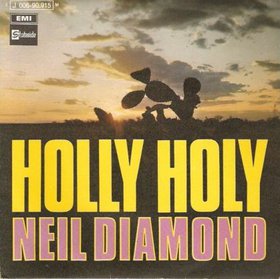
"Holly Holy" is a song written and recorded by Neil Diamond with instrumental backing provided by the American Sound Studio house band in Memphis. Released as a single on October 13, 1969, it was a successful follow-on to "Sweet Caroline", reaching #6 on the U.S. pop singles chart by December. The song also reached #5 on the Easy Listening chart. It became a gold record and then eventually a platinum record.

"Yesterday's Songs" is a 1981 single by Neil Diamond from his album On the Way to the Sky. The song was a major adult contemporary radio hit, spending six weeks at #1 on the U.S. Billboard chart and four weeks atop the Canadian Adult Contemporary chart. On the Billboard Hot 100, it peaked at #11. On the Canadian pop charts, the song reached #15. "Yesterday's Songs" is ranked as the 77th biggest American hit of 1982.

"Break It Up" was the fourth single taken from the album 4 by the band Foreigner. The song was written by Mick Jones and the first to feature a B-side that was not available on one of their albums, a live version of their hit, "Head Games."

"Somethin' 'Bout You Baby I Like" is a popular song written by guitarist Richard Supa in the early 1970s. The version by Tom Jones reached No. 36 in the UK in 1974. Glen Campbell and Rita Coolidge reached No. 42 in the US with their recording of the song in 1980.

"Desirée" is a 1977 song written and recorded by Neil Diamond and included as a track on Diamond's 1977 album, I'm Glad You're Here with Me Tonight. The single peaked at number 16 on the Billboard Hot 100 and reached number one on the U.S. Easy Listening chart to become his fifth number one on that chart. The song likewise reached number one on the Canadian AC chart.

"Love on the Rocks" is a song written by Neil Diamond and Gilbert Bécaud that appeared in the 1980 movie The Jazz Singer and was performed by Diamond on the soundtrack album to the film. It was also released as a single and reached #2 on the Billboard Hot 100 for three weeks in January 1981. The song also made it to #3 on Billboard's US Adult Contemporary chart. Billboard rated it as the #26 pop single overall for 1981. It performed less well in the UK, reaching only #17. It was covered by Millie Jackson on her 1981 album Just a Lil' Bit Country, and by Gladys Knight on the album Great Solo Performances by Guest Artists from the Tom Jones Show, Vol. 1. Bécaud recorded the song in French as L'Amour est mort on his 1981 eponymous album.
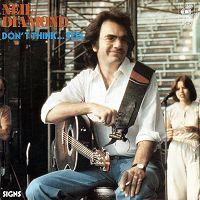
"Don't Think... Feel" is a 1976 song by Neil Diamond from the album Beautiful Noise. It was released as a single in October 1976 and reached #43 in the US Hit Parade. The B-side was "Home is a Wounded Heart".

"Stormy" is a hit song by the Classics IV released on their LP Mamas and Papas/Soul Train in 1968. It entered Billboard Magazine October 26, 1968, peaking at #5 on the U.S. Billboard Hot 100 chart and #26 Easy Listening. The final line of the chorus has the singer pleading to the girl: "Bring back that sunny day". The single, along with the prior release of "Spooky" and, soon after, the release of "Traces", formed a trio of solid hits for the band.

"History Repeats Itself" is a 1966 narrated song written and recorded by Buddy Starcher. It became his greatest hit, reaching number 39 on the U.S. Billboard Hot 100 and number two on the Country singles chart.

"Odds and Ends" is a 1969 song by Dionne Warwick, written by Burt Bacharach and Hal David. It was released as a non-album single. Narrowly missing the U.S. Billboard Top 40, it reached the Top 20 on the Adult Contemporary charts of Canada and the U.S., where it peaked at number seven.
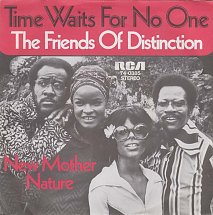
"Time Waits for No One" is a song written by Neil Sedaka and Howard Greenfield, and originally recorded by Sedaka in 1970.
References
- ↑ "Done Too Soon" by Neil Diamond at Songfacts.com
- ↑ "CashBox Record Reviews" (PDF). Cash Box. May 8, 1971. p. 20. Retrieved 2021-12-10.
- ↑ Joel Whitburn's Top Pop Singles 1955–1990 - ISBN 0-89820-089-X
- ↑ "Item Display - RPM - Library and Archives Canada". Collectionscanada.gc.ca. 1971-06-19. Retrieved 2020-06-18.
- ↑ Joel Whitburn's Top Pop Singles 1955–1990 - ISBN 0-89820-089-X
- ↑ Cash Box Top 100 Singles, June 12, 1971